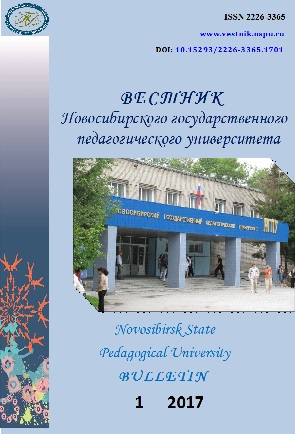Инклюзивное образование как системная инновация
Inclusive education as a systemic innovation
Author(s): Alevtina Gennadievna RyapisovaSubject(s): Inclusive Education / Inclusion
Published by: Новосибирский государственный педагогический университет
Keywords: Innovation; system innovation; classification of innovations; inclusive education; education system; system approach; concept of development of inclusive education; quality education;
Summary/Abstract: Introduction. The article examines the signs of systemic innovation on the example of the introduction of inclusive practices in modern conditions of Russian education modernization. The purpose of this article is based on the study of scientific-theoretical sources and the analysis and synthesis of innovative practices to substantiate the traits of a systemic innovation in inclu-sive education. Materials and Methods. The methodology of the article are legal documents in the field of education, reference and textbooks, nonfiction materials, as well as the work of foreign and domestic scientists, the credibility and scientific reputation which are recognized by the scientific community, and the achieved in prominence high level research inclusive education. Results. Economics and pedagogy are determined on the basis of consideration of the conceptual apparatus from the standpoint of philosophy, as well as the essential and specific characteristics of innovation. The study of the evolution of innovation and the diversity of their types and types make it possible to present the classification system of innovation influence, the strength and scale of impact on the entire education system. There were outlined the allocated spot (local), linear (horizontal plane); structure (spherical, spatial, architectural); the fundamental (base); radical (actually the system); multidimensional (versatile, global) and nadcisnie-nie some innovation. By deduction the thesis that the introduction of inclusive education in mainstream educational space requires a system of development tailored to the specific socio-cultural conditions and educational policy is substantiated. In the text highlights of the most im-portant directions of innovative activity of educational institutions (the creation of an inclusive culture, develop inclusive policies and the implementation of inclusive practices) is given. Conclusions. In conclusion it is emphasized that solving problems in the field of inclusion makes a significant transformation in all elements of the education system and the determined image optimize, improve and stimulate the educational environment at the regional and sectoral level, as befits a true system innovation. The conclusion is justified that the introduction of inclu-sive education in mainstream educational practice as a fundamental, structural, radical, multi-dimensional innovation system has sufficient resources to improve the quality and increase the efficiency of education.
Journal: Вестник Новосибирского государственного педагогического университета
- Issue Year: 7/2017
- Issue No: 1
- Page Range: 7-20
- Page Count: 14
- Language: Russian

